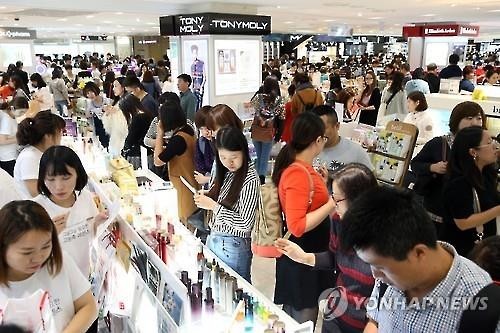[News Analysis] Korea closely monitors China’s latest import rule as THAAD tension rises
By Won Ho-jungPublished : March 2, 2017 - 17:52
The latest trade tension with China comes in the form of a new registration process for certain cosmetics imported from South Korea to China through ports in the Pudong New Area of Shanghai. The measure took effect Wednesday, according to the Korea International Trade Association Thursday.
The new cosmetics regulations, which were announced in January, allows certain cosmetics brought in through Pudong to be distributed after a simple registration process before going through the existing license approval process. In essence, the major change is that these cosmetics can undergo the time-consuming administrative approval process after their release, rather than before.
These regulations go into effect as Korean companies with ties to China carefully monitor the market there in the wake of rising tensions over the installment of an anti-missile Terminal High Altitude Area Defense system here in Korea.
The new cosmetics regulations, which were announced in January, allows certain cosmetics brought in through Pudong to be distributed after a simple registration process before going through the existing license approval process. In essence, the major change is that these cosmetics can undergo the time-consuming administrative approval process after their release, rather than before.
These regulations go into effect as Korean companies with ties to China carefully monitor the market there in the wake of rising tensions over the installment of an anti-missile Terminal High Altitude Area Defense system here in Korea.

The cosmetics industry, which is heavily reliant on the Chinese market, is for the time being remaining cautious on the latest developments.
Tension has been escalating since Tuesday, when the Korean Defense Ministry signed a land swap deal with Lotte Group to acquire land in the Seongju region, southeast of Seoul, to install the battery.
Following the decision, Lotte has suffered significant backlash from China. Lotte’s products were pulled from popular online shopping malls such as JD.com and beauty shopping mall Jumei, with the CEO of Jumei even posting on social media that the site will no longer be selling Lotte products. Alibaba‘s Tmall also closed down its Lotte shop last month.
At noon on Thursday, Lotte‘s online duty-free website was hit with a Distributed Denial of Service attack, shutting down the site in all four languages. The site was restored around 3 p.m.
A Lotte Duty Free spokesman said that sales from the online duty-free store generates about 4 billion won ($3.5 million) per day, meaning that prolonged attacks such as this one could lead to massive sales losses for the company.
Lotte’s Chinese site www.lotte.cn was also the target of a virus attack, bringing down the site on Wednesday. As of 4:30 p.m. Thursday, the site is still closed.
As consumer sentiment continues to turn against Lotte, the company may face widespread damage to its business interests, which include not only online sales but offline sales at 120 retail outlets in China and significant sales from Chinese tourists at its duty-free stores and department stores here in Korea.
While Lotte appears to have been pinpointed in a retaliation reaction, South Korean performers and companies in general have been facing a more subtle but tougher business environment there.
China’s media has also been raising its voice, including the Global Times, which recently wrote in an op-ed that “Chinese consumers should become the main force in teaching Seoul a lesson, punishing the nation through the power of the market.” It added that other popular South Korean retailers and elements should also be sanctioned by Chinese buyers.
According to the Korea Trade-Investment Promotion Agency, there are some 3,600 South Korean companies advanced to China. They are mainly overseas offices of Korean-based firms, branches and liaison offices.
As for the cosmetics industry, the latest change in registration process for imports to Shanghai only applies to companies that have a corporate entity registered in the Pudong New Area that can be held accountable for the cosmetics being imported. The registration process also excludes specialty cosmetics that are designed for skin improvement, such as whitening or anti-wrinkle products.
While the process is simplified that will allow faster introduction of new products, it can also bring more risks, as while the registration time has been shortened, the certification process remains the same.
In particular, companies whose brands fail the certification evaluation must not only halt sales but also retrieve already-sold products.
“Fortunately, we are not seeing any direct impact (from THAAD) in our Chinese business, but we are cautiously watching whether these negative consumer sentiments will spill over to Korean products in general,” said a spokesperson for a cosmetics company that operates in China.
Another official of a cosmetics firm said, “Generally speaking, the switch to registration process is a positive one because companies can bring in new products faster. But right now, it doesn‘t apply to us.”
According to the spokeswoman, the change will likely affect only new, smaller cosmetics companies that do not currently hold licenses for importing products into China and were hesitant to undergo the administrative approval process.
By partnering with a corporation in Shanghai, these companies will be able to enter the market without completing the complex approval process beforehand.
The KITA report cautioned that these types of companies should take special care when preparing their documents to launch their products in Korea, because companies choosing the simplified registration process are likely to be regulated “more strictly than before.”
By Won Ho-jung (hjwon@heraldcorp.com)

















![[KH Explains] Hyundai's full hybrid edge to pay off amid slow transition to pure EVs](http://res.heraldm.com/phpwas/restmb_idxmake.php?idx=652&simg=/content/image/2024/04/18/20240418050645_0.jpg&u=20240418181020)

![[Today’s K-pop] Zico drops snippet of collaboration with Jennie](http://res.heraldm.com/phpwas/restmb_idxmake.php?idx=642&simg=/content/image/2024/04/18/20240418050702_0.jpg&u=)